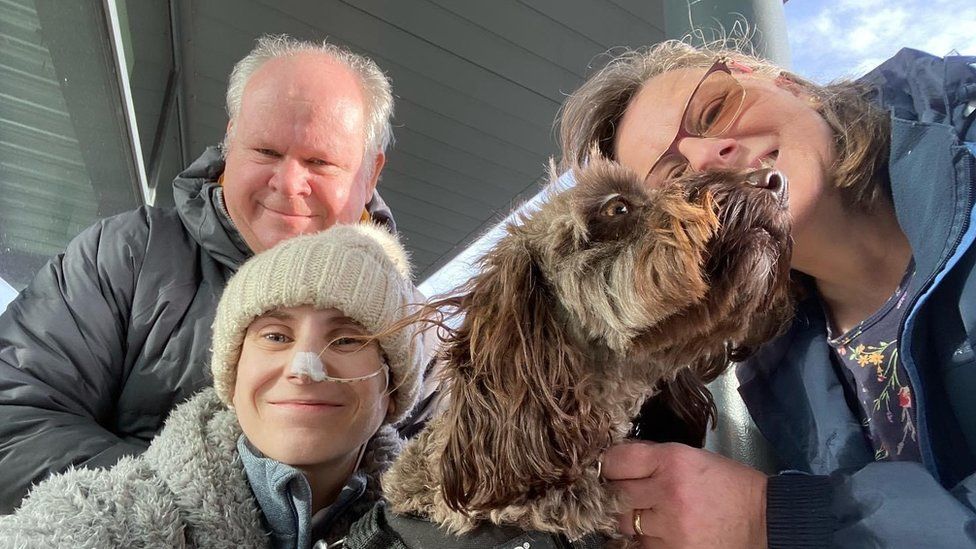ARTICLE AD BOX
By Nicola Bryan
BBC News
 Image source, Molly Leonard
Image source, Molly Leonard
"Sometimes you just need a hug from your mum," says Molly Leonard who has spent months apart from her family to be treated for anorexia
A woman with anorexia said being treated for up to six months, while hundreds of miles from her family has been "awful".
Molly Leonard, 24, from Rhoose, Vale of Glamorgan, has spent time in units in London, Bristol and Glasgow.
There is currently no specialist residential unit for people with eating disorders in Wales.
The Welsh government said it was looking at the feasibility of an eating disorder unit in Wales.
Molly estimates she has spent about a quarter of the past 10 years in specialist residential units.
She said there were times when the only contact she could have with loved ones was through video calls and text messages.
"They ship you off miles away," she said.
Image source, Molly Leonard
Image caption,Molly lives at home with her parents in Rhoose
"You just need to be close to home, especially when you're in such a fragile state.
"You're just taken away to a place you may never have been, with people you don't know, and it is very scary."
She said being able to see loved ones affected her recovery: "Sometimes you just need a hug from your mum and your mum to just tell you that everything will be okay and you just can't get that.
"It's ridiculous, because part of recovering is getting back to normality and part of that is being able to spend time with your family and friends."
Eating disorder charity Beat's National Lead for Wales Jo Whitfield said: "There are no adult inpatient eating disorder services within Wales."
"If somebody aged 18 or over needs to be hospitalised with an eating disorder, this will happen outside of the country."
She said having eating disorder treatment far away from home could be "very distressing and isolating".
She added: "Families are often unable to visit regularly, which can be very difficult for both the person who is unwell and their loved ones."
She said patients are less likely to need hospital treatment if they can access eating disorder treatment in their local area.
"If many people in Wales are needing hospital treatment for an eating disorder, this suggests they are not getting the support they need quickly enough," she said.
Image source, Molly Leonard
Image caption,Molly Leonard's most recent hospital stay was in March 2022
Molly, who is one of an estimated 58,000 people in Wales with an eating disorder, said she first began obsessing over calories and exercise when she was 15 years old.
It coincided with her grandfather being unwell and having a tough time at school.
"It completely engulfs you, everything you do, everything you think is about food or how to lose weight, or about just shaming yourself for the way that you look," she said.
She began not eating and lying when asked about it.
But when she was 18 and moved away from home to study at Oxford Brookes University, she said that things got "really bad".
When she was 19 she sought help from a GP for the first time and was immediately sent to A&E because her potassium levels were dangerously low.
Within months she was sectioned and spent about six months at an eating disorder unit in Oxford.
She said she was not ready to engage with treatment at that time but being hospitalised near where she lived was a help: "I had my friends around me, which was really good".
It was to be her first hospital stay of many.
Within a year of being discharged, she was sectioned again and was sent to an eating disorder unit in London.
"The eating disorder had full control of me and I wasn't at a point where I wanted to accept help for it.
"The only thing on my mind was I wanted to lose weight," she said.
Her illness led her to quit university and move home to Wales, just before the Covid pandemic hit.
Image source, Molly Leonard
Image caption,Molly said she was sharing her story to try and help others
She busied herself making facemasks, raising over £600 for eating disorder charity Beat.
But it wasn't long before she started losing weight again.
She briefly moved out of the family home to St Albans, Hertfordshire and ended up back in hospital - this time a general hospital in London.
While there she said she was told she was being moved to Glasgow because it was the only bed available at an eating disorder unit in the UK.
"I honestly thought they were joking when they told me that but I was under section so I didn't have a choice," she said.
Covid restrictions meant she could not have any visitors.
While at the Glasgow unit she met other patients from Wales who were "struggling just as much as I was".
Molly ran away from the hospital several times.
She was told she was a Covid risk, so her father drove from south Wales to collect her and bring her home, she said.
Since returning from Glasgow has been sectioned several times, initially spending six months at another specialist unit in London.
Image source, Molly Leonard
Image caption,Molly is one of an estimated 58,000 people in Wales with an eating disorder
Last summer Molly hit rock bottom. She was sent to Cardiff's University Hospital of Wales.
"There's a week of my life that I have no recollection of.
"I honestly don't remember what happened. Apparently I was refusing treatment, I wasn't eating or drinking, I was refusing everything, pulling cannulas out," she said.
She was sectioned and sent to the Hafan y Coed mental health unit at University Hospital Llandough, Vale of Glamorgan.
Image source, Molly Leonard
Image caption,This photo was taken after Molly came out of hospital in Bristol in April
Her most recent residential treatment was a few months at an eating disorder unit in Bristol at the start of this year.
"I was honestly at the point of being put into palliative care because things had got so bad.
"It was honestly the lowest point," she said.
"My mum was telling me she was scared to wake up every morning, just in case she found me having not woken up."
Molly said since then she has turned a corner. She attributes the change to her love of crafting.
She has always enjoyed crafts, everything from making candles or earrings to flower arranging - and while in hospital in Bristol, she began doing craft sessions for other patients.
Image source, Molly Leonard
Image caption,Molly said making crafts and teaching others is helping her get better
Since returning home from hospital in April she has been running taster craft sessions at her local library and hopes to build it into a business, with the help of The Prince's Trust and Big Ideas Wales.
"I really think that, from my experience, I can help people to get over their mental health through craft because it's helped me so much. It's changed my life," she said.
Molly is determined to get better.
"I've been struggling with this since I was 15 and next year I'll be 25. I just don't want the eating disorder to been ruling my life for 10 years, it's too long," she said.
"'I've got ambitions and I've got things that I want to be doing and that is stopping me."
Image source, Molly Leonard
Image caption,Molly has been running taster craft sessions at her local library
A Welsh government spokesperson said: "We are increasing investment in eating disorders services.
"Most people who need to access services, including in-patient care, will receive this care in Wales and we are also working with NHS Wales to scope the feasibility of a specialist eating disorder unit in Wales.
"We expect all health boards to provide specialist, multi-disciplinary support for people with eating disorders."

 2 years ago
39
2 years ago
39








 English (US) ·
English (US) ·